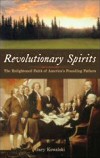Revolutionary Spirits, by Gary Kowalski
 Revolutionary Spirits: The Enlightened Faith of America’s Revolutionary Fathers by Gary Kowalski. BlueBridge, 2008. 215 pages. $22.00. ISBN: 1 933346094
Revolutionary Spirits: The Enlightened Faith of America’s Revolutionary Fathers by Gary Kowalski. BlueBridge, 2008. 215 pages. $22.00. ISBN: 1 933346094
Reviewed by Harriet Rafter, San Francisco State University.
What were the religious beliefs of the men we consider this country’s Founding Fathers: Benjamin Franklin, George Washington, Thomas Paine, John Adams, Thomas Jefferson, and James Madison? Did they intend the country they helped to create to be Christian? Were they observant Christians themselves? Would their religious beliefs and practices pass muster with those self-styled “values voters” whom American politicians now feel and fear they must court? These are the questions that Gary Kowalski asks in this short and informative book. Formerly this topic would have been an academic exercise, of scholarly interest only. Now that we are reminded daily of the enormous role that religion plays in world politics and events, the faith of these men assumes weightier importance.
Kowalski’s witty title actually introduces a story more complex-and to my mind, far more interesting-than the faith of these men, for the revolutions in which they participated were scientific, industrial, philosophical, as well as political. They knew the inventors and scientists who made this new world; they belonged and contributed scholarly papers to the same clubs and societies. Ben Franklin, Thomas Paine, and George Washington (along with Ethan Allen, Alexander Hamilton, John Hancock, John Marshall, and Paul Revere) were even Freemasons, which makes them brothers in the Craft to Mozart and Kipling and, by extension, to their fictional brethren, the wise Sarastro and Tamino, as well as those over-reachers, Peachy Carnahan and Daniel Dravot.
Kowalski guides readers painlessly and sometimes humorously through 18th century history and thought. In the introduction, he shows how many religions were practiced in the American colonies and, Puritans aside, how varied were the reasons for leaving Europe and the ways of thinking and living in the New World. Chapters two and three are particularly helpful. Chapter two investigates the philosophical basis of the Enlightenment and the concept of separation of church and state. And it introduces Deism, the form of religion which most of Kowalski’s subjects (and a good many of their philosophical descendants) espoused:
The cosmos presented a folio of order and regularity signed in the Creator’s own hand, a testament prior to any written scripture (literally old as the hills). . . . America’s founders sensed the sacred in the laws and harmonies of nature, rather than in the miraculous suspension of those laws. [. . .] when they referred to a deity it was most often under the rubric of Chief Architect or Grand Designer-the God revealed in the workings of earth and sky rather than the tradition God of Abraham and Isaac. [. . .] They worshiped in the cathedral of Creation (21).
Chapter three graphically describes how the European worldview was affected by the Enlightenment-and here, I feel, Kowalski’s book takes off, as he illustrates the before-and-after treatment of the mentally ill, or people accused of sorcery. Having set the stage, he then devotes a chapter to each of these six men and the role religion played in his life.
Now, liberal and tolerant Christians or ardent Deists the Founding Fathers may have been; it does not matter to me. Far more interesting is how they actively participated in the Enlightenment: they were soldiers, farmers, architects, astronomers, inventors, scientists, theorists and practitioners of war and government and education, and sometimes even pranksters (that naughty Ben Franklin). They lived during many and simultaneous revolutions when the world which so dazzled them was being conceived anew, and they were fortunate to be personally involved.
In his last chapter, Kowalski describes how their broadminded and intellectual approach to the world changed with the next generations to prejudice–Freemasonry became the object of suspicion and disrepute–and Romanticism: “religion exerted an ongoing literary influence . . . but its epistemology was romanticized from a faith grounded in observation and experiment to one based on feeling and intuition” (191). If we agree to consider these men fathers of the newborn republic cradled along the Atlantic shore, their heirs include such ebullient and, yes, romantic, American spirits as Emerson, Thoreau, Whitman, Stegner and De Voto, Abbey, and Edison, among many American writers, scientists, inventors. John Muir, for instance, combined the scientific and the ecstatic in writing the Founding Fathers certainly would have understood:
“The radiance in some places is so great as to be fairly dazzling, keen lance rays of every color flashing sparkling in glorious abundance, joining the plants in their fine, brave beauty-work-every crystal, every flower a window opening into heaven, a mirror reflecting the Creator”.(fn.1)
While Kowalski’s contribution to our knowledge of the faith of our Founding Fathers is no doubt valuable, I feel that his greater achievement is to briefly but vividly set the scene of the intellectually thrilling era in which they lived, and show how each responded with awe and a hunger to address the issues of the day. To paraphrase two other thinkers at critical historic moments, it was, not wholly or in full measure but very substantially, a brave new world indeed to have such people in it.(fn.2) If these are our fathers, we had best make some effort to recapture the intellectual and ethical standards they have bequeathed us.
- 1 My First Summer in the Sierras. 1911. Harmondsworth, England: Penguin Books, 1997. 153.
- 2 Despite his admiration for Thomas Jefferson, Kowalski describes Jefferson’s role as a slave owner pretty bluntly. And he points out-lest we rationalize Jefferson’s refusal to free his slaves as a response to his own times-that his neighbor, Edward Coles, freed his, and later was elected governor of Illinois.